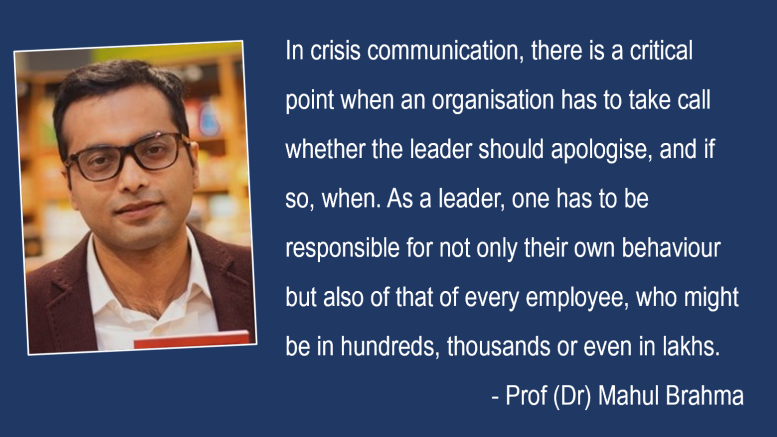In this day and age of generative artificial intelligence, there is a growing compulsion to steadily eliminate the human factor in systems and processes, and communication or media is no exception. More and more the usage, the more and more will be the data that the machine can churn to throw up a better result.
However, in crisis communication, there is a critical point when an organisation has to take call – whether the leader should apologise, and if so, when. Is the leader responsible directly for the crisis or is it an organisational failure of a system to deliver? As a leader, one has to be responsible for not only their own behaviour but also of that of every employee, who might be in hundreds, thousands or even in lakhs. The first question is – who is the guilty party responsible for the crisis? The degree of damage is a point of consideration as well.
The machine will not have an answer.
A leader’s apology is a performance in which every expression matters and every word becomes a part of the public record, according to Harvard Business Review. Refusal to apologise can be smart, or it can be suicidal. Conversely, readiness to apologise can be seen as a sign of a strong character, or as weakness, the reports states. A successful apology can turn enmity into a personal triumph, while an apology too little, too late can bring on institutional ruin.
Let me elaborate with an example:
“I apologise profusely. I am the leader of this company, and I have to take responsibility. That is why I am here. I am not running away from my obligations. Even though we don’t know what’s wrong, the passengers were on my aircraft and I have to take responsibility for that.”
Air Asia, Circa December 2014. The apology was a demonstration of empathy and its voice and touch and be heard, felt and recognised instantly…especially in the middle of a crisis. There words speak volumes of the human factor added by Tony Fernandes, then Group CEO of AirAsia after the fatal disappearance of flight QZ8501. This is an oft-cited example of how even in the middle of crisis empathetic communication is able to win hearts.
Now imagine the series of critical decision-making that goes on during a crisis mitigation. Every word or silence, every action or inaction, is interpreted and thus have its ramifications. While logic and historical data surely has its place, but none can replace the leader’s human factor that is the most crucial element in crisis communication.
No matter how prepared an organisation is with the SOPs of crisis mitigation, a seasoned communicator knows that every crisis is unique and thus has to be handled differently. Thus advanced technology, while it has its own usage in helping the communication process by generating automated response like chatbots or by helping with background research, it surely cannot replace the human factor that is the essence of every crisis communication.
And last but not the least, with an increased predominance of generative AI in communications, there comes the crucial risks of ethics, morality, data privacy as well as of misinformation. The moderation of crisis communication that a human can control can’t be generated by AI, it can only come from the human factor.
The views and opinions published here belong to the author and do not necessarily reflect the views and opinions of the publisher.



Be the first to comment on "ChatGPT versus The Human Factor in crisis communications"